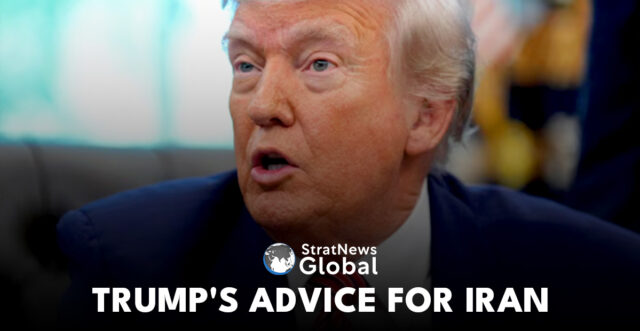U.S. President Donald Trump implied Iran provoked Israel’s attack by defying U.S. demands on its nuclear programme and urged Tehran to strike a deal, warning that “the next planned attacks will be even more brutal.”
Israel launched large-scale strikes against Iran on Friday, saying it had attacked nuclear facilities and missile factories and killed a swathe of military commanders in what could be a prolonged operation to prevent Tehran from building an atomic weapon.
Washington said it had no part in the operation, however.
Iran promised a harsh response to a barrage that killed the heads of both its armed forces and the powerful Revolutionary Guards, and Israel said it was trying to intercept about 100 drones launched towards Israeli territory in retaliation.
But around 0800 GMT, Israeli media said an order to citizens to remain near protected areas had been lifted, suggesting that most or all of the drones had been neutralised.
The price of crude leapt around 9% on fears of wider retaliatory attacks across a major oil-producing region.
Israel’s Attack-Drone Base
An Israeli security source said Mossad commandos had been operating deep inside the Islamic Republic before the attack, and the Israeli spy agency and military had mounted a series of covert operations against Iran’s strategic missile array.
Israel also established an attack-drone base near Tehran, the source added. The military said it had carried out a large-scale strike against Iran’s air defences, destroying “dozens of radars and surface-to-air missile launchers”.
Iranian media and witnesses reported explosions, including some at the main uranium enrichment facility at Natanz. Iran’s Atomic Energy Organisation said Natanz had sustained damage, but no casualties had been reported.
Iran said several top commanders and six nuclear scientists had been killed, including the armed forces chief of staff, Major General Mohammad Bagheri, and Revolutionary Guards chief Hossein Salami. Two sources in the region said at least 20 senior commanders were dead, including the head of the Revolutionary Guards’ aerospace force.
An Israeli military official said the strikes had achieved a great deal but assessments were continuing and Israel was prepared to keep the operation going for days. Among the targets were ballistic missiles pointed towards Israel, they added.
“We are at a decisive moment in Israel’s history,” Prime Minister Benjamin Netanyahu said in a recorded video message.
Just before 6 a.m. Washington time, Trump posted on his Truth Social platform.
“I gave Iran chance after chance to make a deal,” he said.
“There has already been great death and destruction, but there is still time to make this slaughter, with the next already planned attacks being even more brutal, come to an end. Iran must make a deal, before there is nothing left…”
Nuclear Talks Due On Sunday
The Islamic Republic insists it wants nuclear energy only for civilian purposes.
But the IAEA’s Board of Governors on Thursday declared Iran in breach of its non-proliferation obligations for the first time in almost 20 years.
Iran is a signatory to the global Nuclear Non-Proliferation Treaty. Israel is not, and is believed to have the Middle East’s sole nuclear arsenal.
Iran said in a statement that Israel’s “cowardly” attack showed why Iran had to insist on enrichment, nuclear technology and missile power.
Iranian citizens reacted to the strikes with anger and fear.
Some opponents of the ruling clerics expressed hope that Israel’s attack might lead to their downfall, though one Tehran resident who was not a supporter of clerical rule said Iran must retaliate.
“We can’t afford not to respond. Either we surrender and they take our missiles, or we fire them. There’s no other option — and if we don’t, we’ll end up surrendering them anyway.”
The Israeli military said it had been forced to act by new intelligence information showing that Iran was “approaching the point of no return” in the development of a nuclear weapon.
But a source familiar with U.S. intelligence reports said there had been no recent change in the U.S. assessment that Iran was not building a nuclear weapon and that Khamenei had not authorised a resumption of the nuclear weapons programme that was shut down in 2003.
Trump was convening the National Security Council on Friday morning, the White House said. He had said on Thursday that an Israeli strike on Iran “could very well happen” but reiterated his hopes for a peaceful resolution.
Iran’s armed forces spokesperson accused Washington of providing support for the operation.
Secretary of State Marco Rubio said the U.S. had not been involved in the strikes and Israel had acted unilaterally in self-defence.
U.S. and Iranian officials are scheduled to hold a sixth round of talks on Tehran’s escalating uranium enrichment programme in Oman on Sunday.
(With inputs from Reuters)





